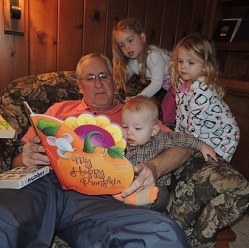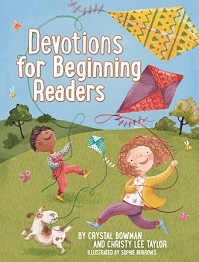Learning to Read
 When should I teach my child to read?
When should I teach my child to read?
It’s a good question, and one that I was often asked during my years as a preschool teacher. Now that I am a children’s author, I am still asked that question. So here’s my answer—you don’t.
Let me explain. Learning to read is developmental. There is no magic age at which a child must be reading or else he or she will be doomed to illiteracy. Let’s compare learning to read to another major childhood accomplishment—learning to use the potty. Some kids are trained by age two. Others are not out of diapers until age three or four. If a two-year-old is not potty-trained, it does not mean he or she will be wearing diapers forever! It just means mommy has to be patient for a few more months.
The same thing is true with reading. Some kids may be reading as early as four years of age, while others might not learn to read until they are six or seven. If you try to teach a child to read before he or she is ready, it will only frustrate the child. And just because some children learn to read early, it doesn’t mean they will always be ahead of other children their age. The best thing parents can do for their children when it comes to teaching their kids to read is to simply read. Here are some tips:
- Read books to your children every day. Young children thrive on routines, so if you establish reading as a daily routine, your kids will not let you skip it!
- Read a variety of books. Books come in all shapes and sizes—just like kids! The age level of a book is not as important as the interest or comprehension level of your child. Choose books that your child will enjoy so that he or she will be excited about reading. From Bible story books to silly story books, almost anything is fine as long as your child will sit and listen.
- Stories written with rhyme and repetition are easier for a child to memorize. Once your child becomes familiar with a story, point to each word as you read. Your child may soon begin to recognize some of the easier words.
- Once you feel your child is ready to start reading, choose books specifically designed for beginning readers. There are several levels of early readers, so start with the simplest text. Read the books with your child until he learns to read some of the text himself. Try reading every other page and let your child read the alternate pages. Once your child masters the first level, you can gradually progress to more challenging levels.
- Be patient! If your child becomes frustrated, reading will become a negative experience. Take your time when you read with your child. If you feel your child is getting tired or discouraged, then put a bookmark in the book and pick it up again later—or choose an easier book.
- Most children are reading by the end of first grade, but there are always some exceptions. If your child is struggling to read, then seek the advice of a reading specialist. Together you may be able to determine the cause for his struggles and give him the tools he needs to become a fluent reader.
Learning to read is a milestone in every child’s life. It opens the door to knowledge about our world, and it takes the reader on wild adventures beyond the imagination. But even when your children learn to read on their own, don’t stop your routine of reading to them. I read to my kids until they were teens. Children love being read to, not only because of the story, but also because of the quality time it offers the parent and child.
Your kids will not be little forever. Love them deeply, pray for them every day, and read!
Crystal


And don’t worry if they can’t recite the alphabet by heart! As you say, enjoyment is the beginning of reading, not parroting 26 letters in order.
Also, it’s great if parents continue reading WITH and TO their child, even once they can read themselves: this, I find is the most effective countermeasure to the claim that “reading is boring” from a child who has previously enjoyed reading. Parents can help their child access literature that is above their reading age, (but still within their comprehension level) – this gives them something to continue aiming for instead of thinking “Well, I’ve ‘done’ reading now, what’s the point?” 🙂
I could go on forever as this is a subject close to my heart, but I’ll stop here and just say: thank you for your post – it rings very true!
Liz
http://www.talesofbassily.com
I love this post, Crystal, and couldn’t agree more. I’d also add that it’s important for kids to see their parents reading for enjoyment on their own too. It models the behavior we hope they’ll pick up and love one day. Reading to my kids (yes, into their teens here, too!) is one of my fondest memories. Now I love doing it with my grandchildren. Thanks for a terrific post!
Such a helpful post, Crystal. I’ve been meaning to tell you that my grandson who just turned 8 loves Devotions for Beginning Readers. I asked him why, and he said because he reads it with his dad and after he prays the prayer with the devotion, his dad prays more about the same thought.
Oh my! These comments are so wonderful! Liz, Linda, and Diane–you all have blessed my day and it’s not even noon yet!
Thank you for taking the time to read the post and leave your thoughful comments!